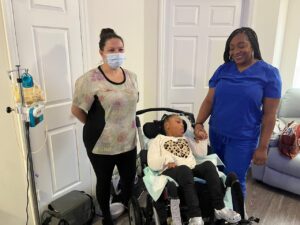Published in The Intelligencer Tuesday, October 30
When my husband and I found out we were pregnant with our third child, we were elated. By this point, we knew what to expect—or so we thought. Every step we took bringing our new baby boy into the world had gone as planned, until we brought him home and realized that something was wrong.
Gideon was born on June 17, 2015. Like his two older brothers, his prenatal screenings indicated he was developing healthily, and on the day he was born he passed his newborn screening test without a hitch. It wasn’t until weeks later that we started noticing that Gideon wasn’t developing at the same rate his older brothers were at his age.
Fast forward to Gideon’s emergency admission into CHOP, where doctors officially diagnosed him with type 1 Spinal Muscular Atrophy (SMA), a rare degenerative disease. Children with this diagnosis rarely live longer than one year, and the doctors advised us to take him home and enjoy him, as he would likely not make it to his first birthday.
But instead, we fought. While there was no treatment or cure for SMA at the time, we learned that CHOP was starting a clinical trial for children like Gideon. Every day we persisted until we got Gideon into the trial, where they dosed him with an experimental drug that was supposed to prevent further muscle degeneration.
In December 2017, the FDA officially approved Spinraza, the drug Gideon received during his trial. Though Spinraza took time to work, Gideon’s disease is no longer progressing and some motor function has slowly returned. It has since been proven that the sooner the drug is introduced into affected children’s bodies, the sooner regression can be stopped and even more—progression can be made.
Had Gideon been diagnosed early and dosed within days of birth, today he would likely be holding his head up, swallowing, sitting unassisted, and walking and running just like his brothers. However, if, like with Gideon, Spinraza is not administered early enough, then mobility and muscle loss come very quickly, and only very slow gains can be made.
We are so grateful that Gideon is home, that we can give him the best life possible, and that—though ant-sized—he is making steps towards regaining function. But we are always wondering about the what ifs: What if we knew he had SMA right away? What if Spinraza been administered to him before the onset of symptoms? And what if we could prevent this from happening to other families? That’s when staff from Gideon’s home health care provider, BAYADA, introduced us to our state representative, Marguerite Quinn.
Representative Quinn came to our home to learn about our family and our struggles. Afterwards, she reached out to local community organizations to help us adapt our home to better fit Gideon’s needs. We were grateful for her assistance but never expected her to do what she did next: Rep. Quinn drafted and introduced legislation to add SMA to state’s mandatory newborn screening list so that the disease can be detected as early as possible.

After introducing the legislation, Rep. Quinn encouraged the state Newborn Screening Advisory Board to support the measure. As a result of her continued efforts, this past week Secretary of Health Dr. Rachel Levine signed the recommendation.
I am in awe of how many children’s lives will have a totally new trajectory due to the state’s actions. Thank you, Rep. Quinn, for bringing attention to this issue and for giving our family and future families across the Commonwealth the opportunity to live a fairer and fuller life.
Ruth M., Gideon’s mom







